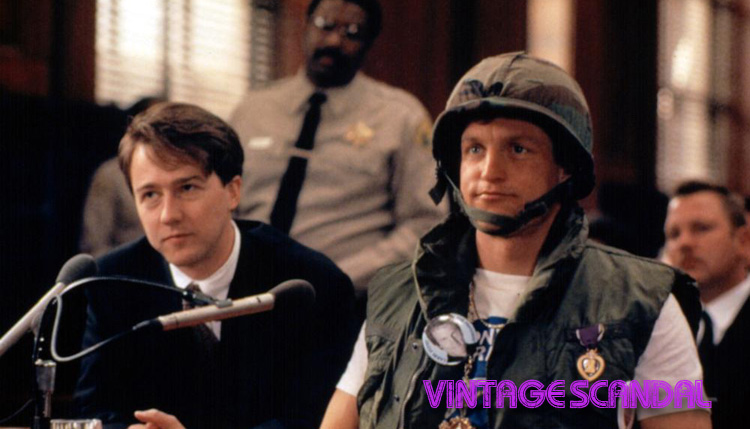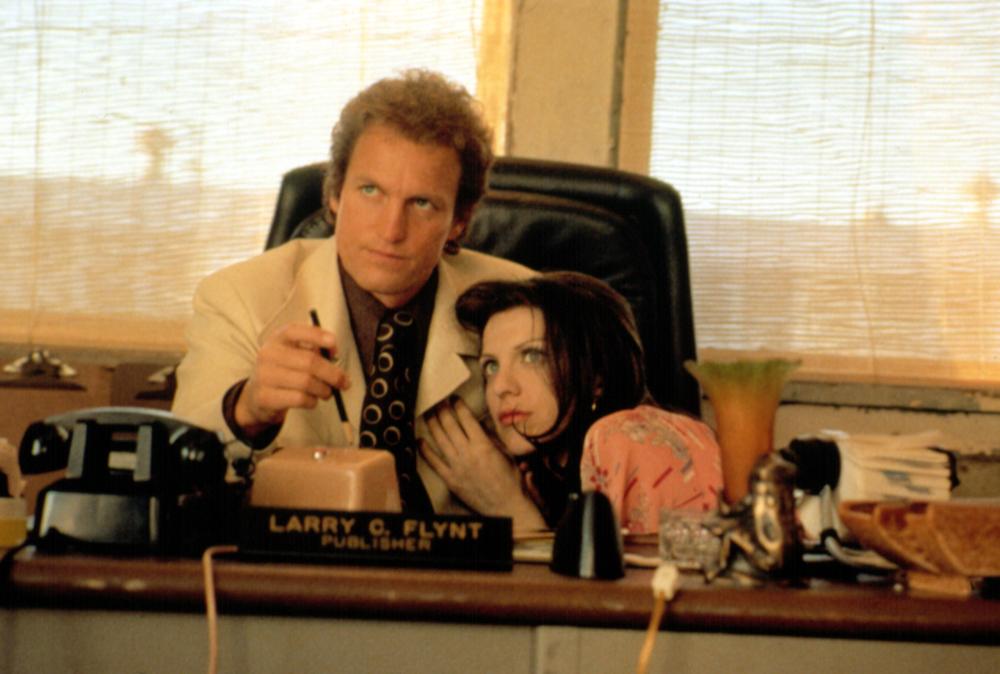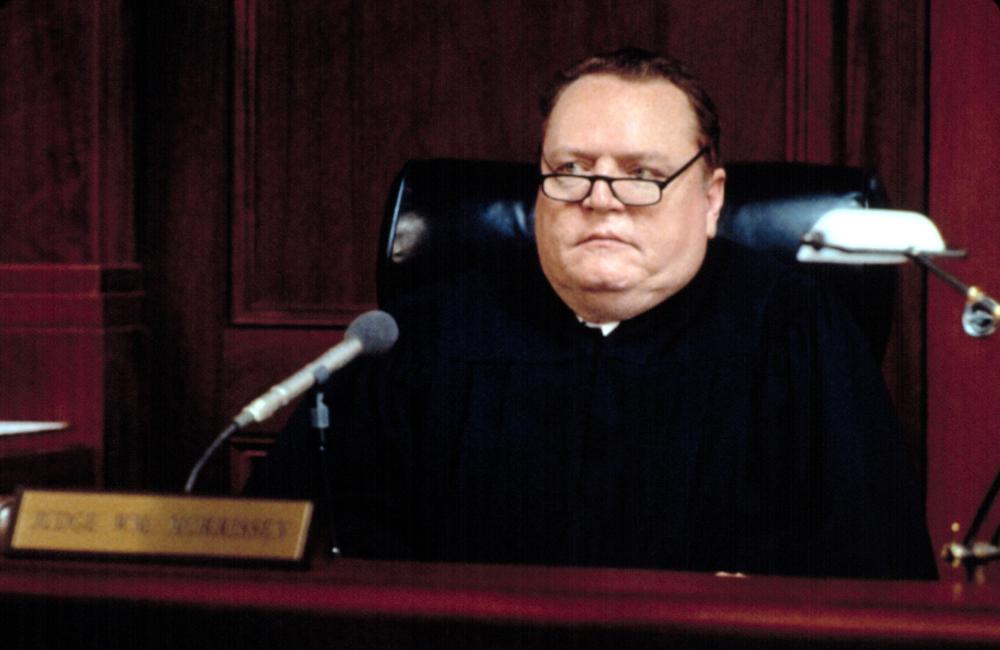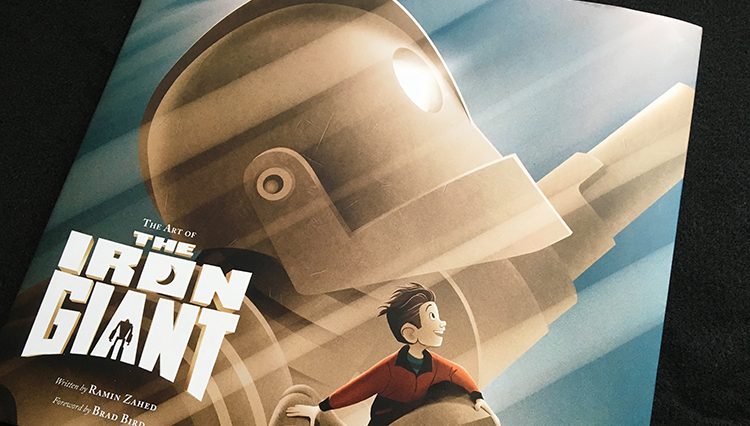
“We live in a free country. And that is a powerful idea. That’s a magnificent way to live. But there’s a price for that freedom, which is that sometimes we have to tolerate things that we don’t necessarily like.”
The People vs. Larry Flynt, 1996 (Woody Harrelson) Columbia Pictures
We need to get out of the way first that a creature such as Kentucky moonshiner Larry C. Flynt (Woody Harrelson) erupted in Ohio, smearing smut, selling Cincinnati up the river with pornography, could emerge as a champion of the First Amendment. The First Amendment to the Constitution. We know that one. Something about religious freedom and the right to petition. That’s all very well and good, but we also have the freedom of speech, freedom of the press, and the freedom of assembly.
It’s too complicated for discussion in a world where tremendous government overreach is designed to make the people forget they actually have those rights. It was very important to the Founding Fathers way back in 1791 because, I surmise, this is what they worried about when attempting to replicate a nation by fission but avoid the tyranny of their own fathers.
For all intents and purposes, we jump forward a couple of decades to when Flynt decided Playboy was a symbol of elitist smut; a pornography for the privileged. Flynt wants to take it down to basics — a working man’s porn. Why not? Do we really need to know how to make the perfect martini? When I was a kid (growing up in Cincinnati, just across the river from Kentucky) they called them “nudie books.”
You’d be shocked not to find a stack of nudie books in your best friend’s dad’s bottom bureau drawer. Everybody, above a certain age, had those books. This nation was founded on smut and illegality. The Kennedys were moonshiners before they became the wealthy elite. The Roosevelts and the Bush family were war profiteers and bootleggers. This is capitalism. How is Flynt any different?
A self-professed smut-peddler, he never intended to become the champion, but the responsibility was thrust upon him because he looked at his livelihood with the eyes of practicality. This was the connective tissue director Milos Forman sought when telling Flynt’s story. The pre-credits sequence shows the 10-year-old Flynt fighting off a redneck lush for trying to steal liquor — he doesn’t want anybody cutting into his profits. Flynt wants to make his money.
It doesn’t matter to him that he’s fighting the battle of his life for freedom of speech and freedom of the Press. This is all about self-preservation. It’s only accidental that his attorney, Alan Isaacman (Edward Norton), is compelled to represent his interests, and then to take that fight to the Supreme Court when Jerry Falwell sues him for libel.
It’s because of this lawsuit that we now have extensive parody disclaimers on everything we see and read. It’s important that people understand the context and why we are where we are. There’s nothing more frightening than witnessing complicity and free-form fascism as dictated by the Press all with the aim of getting the bigger, better story.
A running subplot in The People vs. Larry Flynt is Flynt’s unwillingness to name his source for the video in the famous John DeLorean case, and how the court punished him by fining him $10,000 a day for every day he refused to reveal the source. Flynt’s chicanery and obnoxious mockery of the court earns him jail time for contempt in addition to his daily fine. It’s only then that Flynt finally earns the respect of his peers.
Because this is a story of the ultimate hedonist (at least one of the most popular), we’re subjected to Flynt’s personal life in the form of his wife, Althea (Courtney Love). Love is fine in the role, but is she really acting? It seems to me she’s just playing out the final days of her marriage and life with Kurt Cobain (particularly in scenes where she shoots him up with pain-killers and then partakes of them herself).

Outside of Althea Flynn, I had never seen such a self-destructive personality in my life as Courtney Love. Even after her death, she remains an unsettling lynch-pin in Flynt’s narrative arc, and as with screenwriters Scott Alexander and Larry Karaszewski’s Ed Wood, the story cherry-picks various details of a real person’s life in order to tell a subjectively cinematic story.
There is no mention of Flynt’s three previous marriages (as well as his five children), nor his unsuccessful 1984 bid for a Presidential nomination. The movie would have you believe Althea just hung around and got high and goofy all the time, but in reality, she co-published Hustler with her husband, as well as working in graphic design, advertising, and photography while managing the enormous Flynt Publications empire until her death in 1987.
The heroes of our history are not perfect people, but they are people, flawed with warts-and-all, ugly and inappropriate. Flynt’s own lawyer despises him, but knows he must take this case because while making a name for himself with a high-profile assignment, he is also fighting for free speech, and that is what The People vs. Larry Flynt is actually about.
Althea Flynt died on June 27, 1987. Larry Flynt joined her on this day, February 10, 2021. Rest in peace, Larry.





